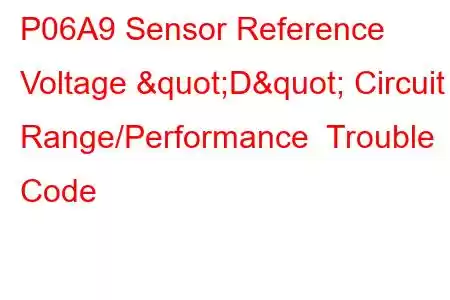P06A9 Sensor Reference Voltage D Circuit Range/Performance
OBD-II Trouble Code Technical Description
Sensor Reference Voltage D Circuit Range/Performance
What does that mean?
This diagnostic trouble code (DTC) is a generic powertrain code, which means that it applies to OBD-II equipped vehicles. That may include but is not limited to vehicles from Ford, Chevrolet, Honda, etc. Although generic, the specific repair steps may vary depending on make/model.
If your OBD-II vehicle has a stored P06A9 code, it means that the powertrain control module (PCM) has detected an out of range reference voltage signal, or performance problem with a particular sensor that has been given the designation "D". The sensor in question is usually associated with the automatic transmission, transfer case, or one of the differentials.
A more specific sensor code will almost always accompany this code. The P06A9 adds that sensor reference circuit voltage is out of range or expected performance. To determine the "D" sensor's location and function for the vehicle in question, consult a reliable vehicle information source (e.g. AllDataDIY). Suspect that a PCM programming error has occurred if the P06A9 is stored alone. You will need to diagnose and repair any other sensor codes prior to diagnosing and repairing the P06A9 - but keep the range/performance reference voltage condition in mind.
The sensor in question is supplied with reference voltage (typically 5 volts) via a switched (energized with the key on) circuit. There will be a ground signal as well. The sensor is going to be of either the variable resistance or electromagnetic variety and it will complete the circuit. Sensor resistance should decrease as pressure, temperature, or speed is increased and vice versa. As the sensor resistance changes (with varying conditions) it provides the PCM with an input voltage signal.
Example photo of a PCM:
If the input voltage signal, received by the PCM, is outside expected parameters, a P06A9 will be stored. A malfunction indicator lamp (MIL) may be also illuminated. Some vehicles will require multiple drive cycles (with a failure) for the MIL to be illuminated. Allow the PCM to enter readiness mode before considering any repair successful. Just clear the code, after repairs are performed, and drive the vehicle normally. If the PCM enters readiness mode, the repair was successful. If the code is reset, the PCM will not enter readiness mode and you know that a malfunction still exists.
Severity & Symptoms
The severity of this DTC depends upon which sensor circuit is experiencing the abnormal voltage situation. Other stored codes must be considered before a determination of severity can be made.
Symptoms of a P06A9 code may include:
Failure of the transmission to shift between sport and economy modes Transmission shifting malfunctions Delayed (or no) transmission engagement Failure of the transmission to switch between all-wheel and two-wheel drive modes Failure of the transfer case to shift from low to high gear Lack of front differential engagement Lack of front hub engagement Erratic or inoperative speedometer/odometerCauses
Possible causes for this engine code include:
Bad sensor Defective or blown fuses and/or fusible links Faulty system power relay Open circuits and/or connectorsDiagnostic and Repair Procedures
A diagnostic scanner, a digital volt/ohmmeter (DVOM), and a trustworthy vehicle information source (like All Data DIY) will be needed to diagnose a stored code P06A9. A portable oscilloscope may also prove helpful in your diagnosis.
First, consult your vehicle information source to determine the location and function of the sensor in question, as it relates to your particular vehicle. Perform a visual inspection of sensor system related wiring har
Read: 34


